Our Jamaica Travel Essentials lays out the essential information you need to help you plan your trip to one of the most popular destinations in the Caribbean. No matter how frequently you travel, some questions will always need answers: What’s the weather like? How can I get from Norman Manley International Airport or Sangster International Airport to my hotel? What currency and type of plug do I need?
We have all these answers plus other basic info about the best time to go, getting there, getting around, and a few useful travel tips. You’ll learn about the most popular landmarks in Jamaica such as Bob Marley Museum, Devon House, and Spanish Town Square. You’ll also learn about the most popular towns and villages in Jamaica such as Kingston, Spanish Town, Portmore, and Montego Bay. It’s all compiled in this Jamaica Travel Essentials. After reading this short and easy-to-read guide, you will be a little more prepared to start your trip to Jamaica.
What are the main towns and villages in Jamaica?

The third-largest island in the Caribbean, Jamaica covers an area of almost 11,000 sq km. Discovered by Christopher Columbus in 1494, it came under British colonial rule in 1655 before gaining independence on 6 August 1962. The island nation features mountains in its central area surrounded by a narrow coastal plain. Jamaica’s capital city is Kingston. The 3 other most populated towns are Spanish Town, Portmore, and Montego Bay.
Kingston
Kingston, on the southeast coast of Jamaica, is the capital city of the island nation and home to a population of about 600,000 inhabitants. The main economic hub of Jamaica, Kingston hosts the HQs of many industrial, financial, and tourism companies. As for visitors, the Old Town is the most interesting part to explore.
Spanish Town
Located in the hinterland 20 km west of Kingston, Spanish Town was the capital city of Jamaica under Spanish and British rules from 1534 to 1872. Many historical buildings and monuments left from that era make the city a captivating place to visit for all history buffs.
Portmore
Portmore sits right between Kingston and Spanish Town. Mainly a residential area, it’s considered a dormitory town for its neighboring cities. It does, however, feature hotels, beaches, as well as many dining and entertainment options.
Montego Bay
Montego, on the northwest side of Jamaica, is the fourth-largest city on the island. It’s also a prime tourism hub, home to beaches, resorts, duty-free shopping, and a cruise ship terminal. The place of Christopher Columbus’s arrival, the city features a choice of historical buildings to visit.
When is the best time to travel to Jamaica?

- Jamaica has a tropical climate with all-year-round warm and humid weather. Average temperatures range from 24°C in winter to 29°C in summer. Note that the climate is more temperate in the mountainous central part of the island.
- With between 12 and 16 rainy days per month, May–October is the wettest time of the year. It rains between 5 and 10 days per month on average the rest of the year. The amount of precipitation also depends on the location on the island. Note that hurricanes can hit the island from June–November.
- June–October is the warmest time of the year in Jamaica. However, as it’s also the rainiest time, it's considered the low season.
- The peak season is from January to April. Expect crowds and high hotel rates at this time of the year. The best time to visit Jamaica is in November–December. This period offers decent weather and significantly smaller crowds. Hotel prices are also a little lower, but it’s worth trying to visit before the December vacations start.
See also
- 10 Best Things to Do in Jamaica
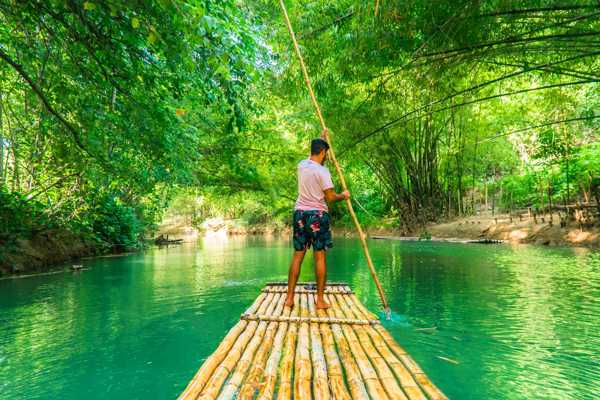
10 Best Things to Do in Jamaica
Jamaica - 10 Best Things to Do in Montego Bay
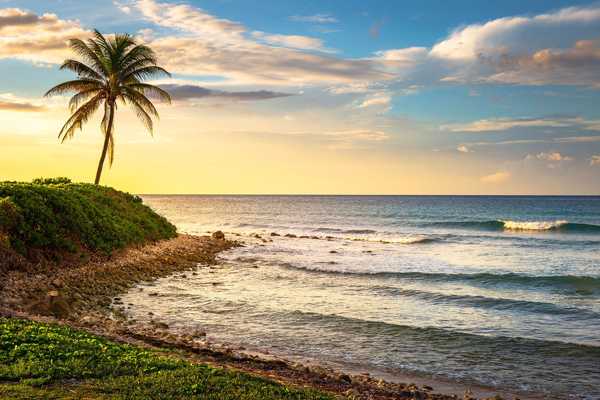
10 Best Things to Do in Montego Bay
Jamaica - What to See and Do in Kingston, Jamaica
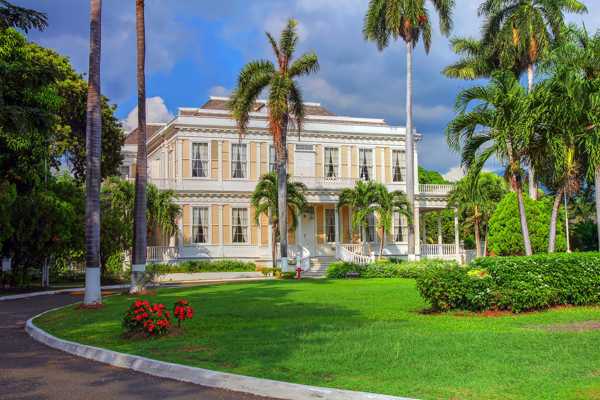
What to See and Do in Kingston, Jamaica
Jamaica
Jamaica basics

- Plug type: A and B
- Electricity: 110 V – 50 Hz
- Currency: Jamaican Dollar (J$ or JA$)
- International dialing code: +1 876
- Emergency telephone number: 110 (ambulance and fire), 119 (police)
How to get to my hotel in Jamaica?

Jamaica has 3 international airports. By order of traffic and importance, these are Sangster International Airport in Montego Bay, Norman Manley International Airport in Kingston, and Ian Fleming International Airport in Ocho Rios. The last of these is a minor airport served mostly by private aircraft and serves very few commercial arrivals compared to the others.
With Jamaica being one of the major destinations on the Caribbean cruise routes, you're just as likely to arrive by sea as by air. Montego Bay, Falmouth, and Ocho Rios all have deepwater ports served by many cruise lines.
Sangster International Airport (MBJ)
Sangster International Airport is the primary airport for tourists visiting Jamaica. It’s located 4 km north of Montego Bay city centre, as the crow flies. The average driving time from the airport to downtown Montego Bay is about 11 minutes.
Free Wi-Fi is available throughout the airport. Ground transportation options available are as follows:
- JUTA and JCAL are the 2 taxi cab companies operating at Sangster International Airport. You’ll find their desk in the central area of the Arrivals Hall.
- Prominent hotels such as Ritz-Carlton, Dolphin Cove, and Club Mobay offer a shuttle service and have a desk in the Arrivals Hall. You’ll also find transfer/tour operators there.
- Thrifty, Avis, and Budget are just a few of the car rental agencies available at Sangster International Airport. Their desks can also be found in the Arrivals Hall.
Norman Manley International Airport (KIN)
Norman Manley International Airport is the airport serving Kingston. It’s located on a peninsula 3.5 km south of Jamaica’s capital. The average driving time from the airport to downtown Kingston is about 30 minutes.
Free Wi-Fi is available throughout the airport. Ground transportation options available are as follows:
- Taxi cabs – the safest and fastest way to get to your hotel. Their rates are regulated by the government.
- Public bus route 98 is the cheapest option to get to downtown Kingston.
- Knutsford Express and other private companies run buses and minibuses that serve Kingston, Montego Bay, Ocho Rios, and most of the towns and villages on the island.
- Hertz, Avis, and Enterprise are just a few of the automobile rental agencies available at Norman Manley International Airport.
- Automobile rental, taxi cab, and bus services desks can be found in the Ground Transportation Hall.
How to get around Jamaica?

Travel tips
The safest way to travel around Jamaica is by taxi cab or minibus. It’s best to use the official taxi cab companies Jamaica Union of Travelers Association (JUTA) and Jamaica Co-operative Automobile & Towncar Tours (JCAL). Local taxi cabs are also available. You can hire a local taxi cab driver for the day and they are usually also excellent and affordable tour guides.
Renting a automobile is a good option for exploring Jamaica, though be prepared for erratic drivers and the fact that Jamaicans drive on the left side of the road. Beware of the speed limit – 50 km/h in towns and minor roads and 80 km/h on main roads and highways. Freeways and primary roads – A-roads – are usually in good condition while B-roads often have potholes.
The Jamaica Urban Transit Association runs a fleet of over 400 public buses. They’re the cheapest way to travel around. They have a quaint, local feel, but tend to be unreliable and slow. Note that certain countries like the United States recommend their citizens avoid this kind of mode of transportation for security reasons.
The island has a reputation of being dangerous, so it’s best to exercise precautions, especially after dark and in places such as the inner-city neighborhoods of Kingston and Spanish Town. That said, using the same basic common sense you would apply in any environment you’re not familiar with should keep you safe. Staying within tourist hot spots is also the best way to avoid problems.
Please also be aware that male homosexuality is forbidden in Jamaica. You should avoid any public displays of affection.
photo by Jason Lawrence (CC BY 2.0) modified
What are the main annual events in Jamaica?

Bob Marley’s Birthday Bash
- 6 February
- Every year, world-famous Reggae singer Bob Marley’s birthday is celebrated in Negril, on the west coast of Jamaica. Prominent Reggae artists come to perform on the beach, offering a festive remembrance celebration to the icon of the Rastafari movement.
- Where: Negril
Bacchanal Jamaica Carnival
- April – the Sunday after Easter Sunday
- One of the largest festive events held on the island, Bacchanal Jamaica is a colorful costumed parade, with talented local bands providing the soundtrack. It goes through Hope Road, Constant Spring, Half Way Tree, and ends at the National Stadium.
- Where: Kingston
Jamaica Independence Day
- 6 August
- Commonly known as Jamaica Festival, Independence Day is a national vacation where everyone can join in. People get dressed in the colors of the country and celebrate the day with huge street parades and cultural displays.
- Where: All around Jamaica
What are the main landmarks in Jamaica?

Bob Marley Museum
The Bob Marley Museum is situated in the former home of Jamaica’s favorite son on Hope Rd, Kingston. The museum hosts a photographic gallery, an 80-seat theater, a record shop, and a gift shop where you will find a wide range of Marley-related memorabilia.
Devon House
Former home of George Stiebel, Jamaica’s first black millionaire, the Devon House mansion was built in 1881. Today, it’s a museum but also a restaurant, a homemade ice cream parlor, a handcrafted gifts shop, and a spa. You can even rent the place for your wedding.
Old Spanish Town Square
Also known as Emancipation Square, Old Spanish Town Square is the historical district of the former capital city of Jamaica. It features well-preserved heritage buildings such as St Catherine Parish Court, Rodney’s Memorial, and Cathedral of St Jago de la Vega, just to name a few.
Fort Charles
Fort Charles overlooks the Caribbean Sea from the tip of the Port Royal peninsula. It was completed in 1660. Today a well-preserved museum, it still stands tall despite the earthquakes and hurricanes that have struck the island through the centuries.
This article includes opinions of the Go Guides editorial team. Hotels.com compensates authors for their writing appearing on this site; such compensation may include travel and other costs.
Start planning your trip
Where to stay in Jamaica
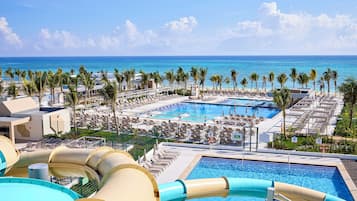
Hotel Riu Palace Aquarelle - All Inclusive

SeaGarden Beach Resort - All Inclusive

Grand Palladium Jamaica Resort & Spa All Inclusive

Hotel Riu Montego Bay - Adults Only - All Inclusive
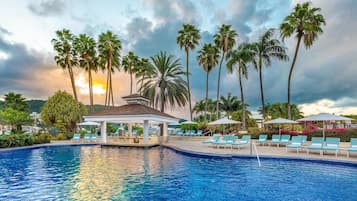
Moon Palace Jamaica – All Inclusive

S Hotel Montego Bay - Luxury Boutique All Inclusive Hotel
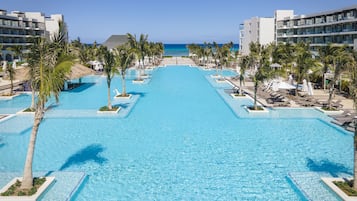
Ocean Eden Bay - Adults Only - All inclusive
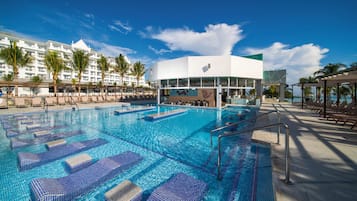
Hotel Riu Ocho Rios - All Inclusive
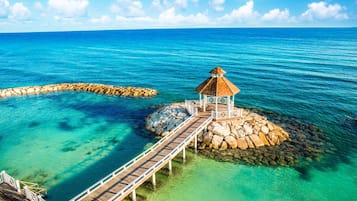
Hyatt Ziva Rose Hall - All Inclusive
Related stories
- 10 Best Things to Do in Jamaica

10 Best Things to Do in Jamaica
Jamaica - 10 Best Things to Do in Montego Bay

10 Best Things to Do in Montego Bay
Jamaica - What to See and Do in Kingston, Jamaica

What to See and Do in Kingston, Jamaica
Jamaica - 10 Great Restaurants in Jamaica
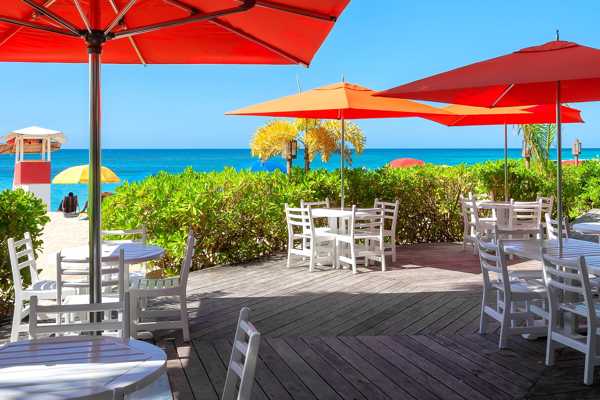
10 Great Restaurants in Jamaica
Jamaica - 10 Best Local Dishes from Jamaica

10 Best Local Dishes from Jamaica
Jamaica - 10 Best Beaches in Jamaica

10 Best Beaches in Jamaica
Jamaica - 10 Best Places to Experience Reggae in Jamaica
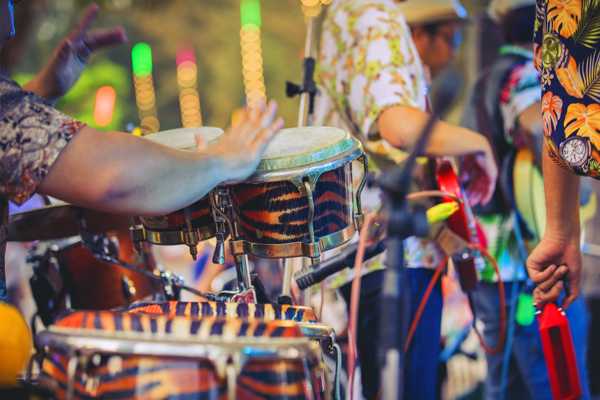
10 Best Places to Experience Reggae in Jamaica
Jamaica - 10 Mistakes People Make When Visiting Jamaica
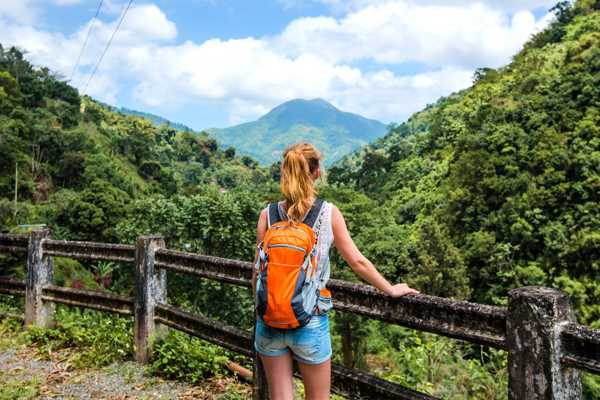
10 Mistakes People Make When Visiting Jamaica
Jamaica
